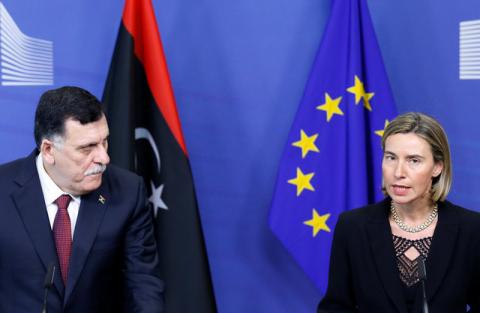Advertisement
Italy vows to help Libya seal borders, urges EU to do same
BRUSSELS/ROME (Reuters) - Italy on Thursday pledged money, training and equipment to help the U.N.-backed Libyan government curb the flow of migrants to Europe, and called on EU leaders to do the same when they meet on Friday.
Prime Minister Fayez al-Seraj flew to Rome from Brussels on the eve of an EU summit in Malta to sign a memorandum of understanding with Italian Prime Minister Paolo Gentiloni.
The agreement aims mainly at providing training and equipment needed to better control Libya's vast, desert borders and bolster its limited coast guard fleet.
"If we want to give real strength and legs to managing migration flows, then there needs to be an economic commitment by the whole of the EU," Gentiloni said.
Italy will use a 200-million-euro fund it launched this week to help Libya, without saying on Thursday how much it would receive. On Friday, the EU is expected to give political backing to efforts to curtail the arrival of refugees and immigrants from Africa, through Libya to Italy.
The bloc is stepping up the training of Tripoli's coastguard and offering more money and aid to Libya and other African countries to seal their borders.
But earlier, in Brussels, Seraj said this was not enough.
"We hope that the EU mechanisms to help Libya will be more practical. We are not going to mention the amount of money ... dedicated to Libya for this help because they are very humble, very small amounts," he said.
The EU has not given an overall figure for aid to Libya, but it has disbursed only a fraction of the maximum of 6 billion euros ($6.5 bln) pledged last year to Turkey in a deal that slashed arrivals of people from Turkish shores to Greece.
Officials say leaders will pledge a further 200 million euros but stress that Africa benefits from tens of billions of euros in aid and other support - funds the EU increasingly wants directed at projects, ranging from economic development to border control, to curb migration.
DEADLY GATEWAY
Arriving to chair the summit in Malta, which lies in the sea-lane between Libya and Italy where more than 4,500 migrants drowned last year, European Council President Donald Tusk said the goal was to stop people setting off.
"This is the only way to stop people dying in the desert and at sea," he said. "The only way to gain control over migration in Europe."
In Rome, Seraj denied he may allow foreign vessels into Libya's territorial waters. Earlier he had said he may invite them if he got aid to build up the navy. For now, an EU mission runs in international waters only.
The route across the Mediterranean is now the main gateway to Europe, with some 181,000 arrivals in Italy in 2016. It is run by smugglers who operate with impunity in Libya, which slid into chaos after the overthrow of Muammar Gaddafi in 2011.
But Seraj's government is struggling to establish control and is contested by various factions, including by the powerful commander Khalifa Haftar, who is being courted by Russia - a relationship that EU officials say they find very troubling.
(Additional reporting by Alastair Macdonald in Valletta, and Robin Emmott in Brussels; editing by Andrew Roche and Robin Pomeroy)



















Add new comment